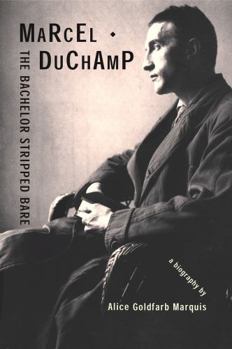Marcel Duchamp: The Bachelor Stripped Bare: A Biography
Marcel Duchamp: The Bachelor Stripped Bare is not the first full-length biography of Duchamp, but it is the first to present him in all his human contradictions and to take a refreshingly objective look at his real contribution to modern art. The well-known facts are explored here: Duchamp's myriad personal relations (with family, lovers, collectors and artists ranging from Man Ray, Picabia and Breton to the Stettheimer sisters and the Arensbergs); the creation of major works such as the "readymades" and the "Large Glass"; his passion for chess and supposed abandonment of art. But beyond this, author Alice Goldfarb Marquis looks past the diffident, humorous mask that Duchamp wore with acquaintance and intimate alike, to explore the passions and insecurities that motivated many of his artistic and personal evolutions. She separates the artist from the con artist, to determine just how profound an influence Duchamp has really been. Based on numerous unpublished sources and first-hand interviews, Marcel Duchamp: The Bachelor Stripped Bare stands as a groundbreaking contribution to the ever-burgeoning field of Duchamp studies.
Format:Hardcover
Language:English
ISBN:0878466444
ISBN13:9780878466443
Release Date:September 2002
Publisher:MFA Publications
Length:368 Pages
Weight:1.79 lbs.
Dimensions:1.1" x 6.4" x 9.2"
Customer Reviews
1 rating
Rocking the Duchamp throne
Published by Thriftbooks.com User , 17 years ago
If you believe in God, read the Calvin Tomkins bio instead. If you don't, read this one. If you're not sure, read 'em both. I believe this is only the second book-length biography of the Dadaist, non-Dadaist (perhaps pre-post-Modernist) painter, artist, post-painter, icon and darling of many. Duchamp is a figure that inspires much talk of isms. He was embraced by the Surrealists, the Pop artists and experimental types during the Sixties, the Postmodernists of the Eighties, and a whole lot more since. By signing a urinal (or was it a toilet bowl?) he created much existentialist angst among the artistic classes. His legacy includes those who cart wheelbarrows full of junk into expensive gallery settings, as well as others almost as sauve as he was. He put his name on the map by throwing out the idea that art can only be made with materials bought in art stories, i.e. paints and clay. He for one preferred shopping in hardward stores. Was he a genius or a hoax? This is the question people like to debate. Certainly he was a humorist, and very ironical. Since his early disillusionment with the Art Establishment, he made much of the idea that the only thing left for art to do was shock. And he was very good at this. The superlative I'll add is that he inspired more thought about art than anyone else in the Twentieth Century. Painting will no longer be just "retinal" (or "painterly" as someone has translated this term). If you enjoy this kind of back-and-forth, you will enjoy this book. Given he was a master ironist, it is fittingly ironical that he should get this more critical handling than usual, by Alice Goldfarb Marquis. Perhaps it's the sign of the times. In another even less kind book, Donald Kuspit blames him in part for ushing in the End of Art. (Surely rubbish, even if too much rubbish has indeed entered the so-called hallowed walls of art.) You get the picture - if you want a fauning bio, this aint the one. But perhaps it's a necessary corrective after so much gushing. Marcel Duchamp once gave his own version of the dictum, "the only bad publicity is no publicity." By that measure, this volume, which is quite well researched, certainly adds to the MD stock. Ms. Marquis is as much about assessing the damage he has wrought on art as the things he has brought to it. Or to rephraze it from the point of view of a believer, of the damage others have wrought in his name. In one of the more shocking lines, she says that "the Avant-Garde has been marching to his beat ever since, as it marches off a cliff." Strong words, but perhaps this is a moment for art to take a new direction. During his life Marcel Duchamp very much promoted the idea that there should be no single correct interpretation of his work, or any work. He saw the spectator as playing an important role in the creation of the art. And so it seems just to have this new biography, that veers from the traditional platitudes about the great man. While I don't ne






